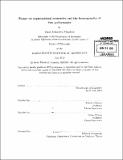Essays on organizational economics and the heterogeneity of firm performance
Author(s)
Venables, Sarah Elizabeth
DownloadFull printable version (7.703Mb)
Other Contributors
Massachusetts Institute of Technology. Department of Economics.
Advisor
Robert Gibbons and Glenn Ellison.
Terms of use
Metadata
Show full item recordAbstract
The first chapter presents a model in which a principal requires an agent to work on multiple tasks, which require varying levels of effort. Initially the appropriate actions are unknown to the principal and so he cannot monitor the agent's effort; however he may succeed in learning the game over time. I provide conditions that ensure full learning and cooperation on all tasks. If these conditions are not met, then the performance of the relationship may depend critically on the order in which tasks are first required and on whether early attempts are successful. We may therefore see variation in long-run performance amongst partnerships facing an identical environment. The second chapter considers the role that mission statements made by firms may play in influencing workers' expectations, and whether these mission statements may thereby constitute informative cheap-talk. I consider a setting in which firms send costless mission statements at the start of the game, then with positive probability have an opportunity to send a costly signal of their type at a later stage. I show that this can generate informative cheap-talk in environments in which, absent the prospect of a costly signal, cheap-talk messages would otherwise be uninformative. However firms will face a welfare trade-off between informative communication and costly signaling, and moreover may be constrained in their ability to adapt to changing circumstances. In the third chapter I present a model of relational contracting in which the principal's type determines the probability that effort generates high output, and where this type is private information. In this setting the bonus payments will be driven by the agent's beliefs, and by the principal's desire to signal her type. I show that we will expect to see higher bonus payments following a run of poor output, given the need to restore the agent's confidence. I then consider an extension in which the agent receives a signal about the performance of the principal's competitors, and so the principal will be under more pressure to "match the market". I argue that this model may explain the dynamics of bonus payments following recessions.
Description
Thesis (Ph. D.)--Massachusetts Institute of Technology, Dept. of Economics, 2013. Cataloged from PDF version of thesis. Includes bibliographical references (p. 111-114).
Date issued
2013Department
Massachusetts Institute of Technology. Department of EconomicsPublisher
Massachusetts Institute of Technology
Keywords
Economics.